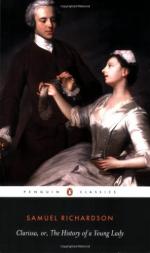But let me ask thee, Belford, whether (on these solemn occasions) the preceding cavalcade; here a greater officer, and there a great minister, with their satellites, and glaring equipages; do not prepare the eyes of the wondering beholders, by degrees, to bear the blaze of canopy’d majesty (what though but an ugly old man perhaps himself? yet) glittering in the collected riches of his vast empire?
And should not my beloved, for her own sake, descend, by degrees, from goddess-hood into humanity? If it be pride that restrains her, ought not that pride to be punished? If, as in the eastern emperors, it be art as well as pride, art is what she of all women need not use. If shame, what a shame to be ashamed to communicate to her adorer’s sight the most admirable of her personal graces?
Let me perish, Belford, if I would not forego the brightest diadem in the world, for the pleasure of seeing a twin Lovelace at each charming breast, drawing from it his first sustenance; the pious task, for physical reasons,* continued for one month and no more!
* In Pamela, Vol. III. Letter XXXII. these reasons are given, and are worthy of every parent’s consideration, as is the whole Letter, which contains the debate between Mr. B. and his Pamela, on the important subject of mothers being nurses to their own children.
I now, methinks, behold this most charming of women in this sweet office: her conscious eye now dropt on one, now on the other, with a sigh of maternal tenderness, and then raised up to my delighted eye, full of wishes, for the sake of the pretty varlets, and for her own sake, that I would deign to legitimate; that I would condescend to put on the nuptial fetters.
LETTER XII
Mr. Lovelace, to John Belford,
Esq.
Monday afternoon.
A letter received from the worthy Captain Tomlinson has introduced me into the presence of my charmer sooner than perhaps I should otherwise have been admitted.
Sullen her brow, at her first entrance into the dining-room. But I took no notice of what had passed, and her anger of itself subsided.
’The Captain, after letting me know that he chose not to write till he had promised the draught of the settlements, acquaint me, that his friend Mr. John Harlowe, in their first conference (which was held as soon as he got down) was extremely surprised, and even grieved (as he feared he would be) to hear that we were not married. The world, he said, who knew my character, would be very censorious, were it owned, that we had lived so long together unmarried in the same lodgings; although our marriage were now to be ever so publicly celebrated.
’His nephew James, he was sure, would make a great handle of it against any motion that might be made towards a reconciliation; and with the greater success, as there was not a family in the kingdom more jealous of their honour than theirs.’




